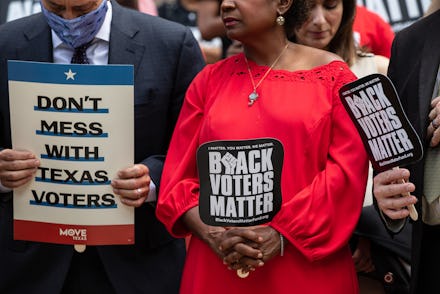Texas Democrats are literally leaving the state to protest a GOP-backed voter suppression bill

Just over a month ago, Texas Democratic lawmakers staged a dramatic last-minute walkout of the state's capitol building in Austin, temporarily blocking a GOP-led effort to pass one of the most restrictive voter suppression bills in the country. Now, with the Texas legislature poised to revisit the bill during a special lawmaking session, state Democratic leaders are once again preparing to deny Republicans the requisite quorum to pass the bill — not simply by walking out of the building, but by leaving the state entirely.
All told, at least 58 Democratic lawmakers are expected to leave Monday, the majority of whom plan to fly to Washington, D.C., on a pair of chartered planes, according to a source familiar with the group's plans who spoke with NBC News. In doing so, the group risks not only exposing themselves to political criticism, but actual criminal consequences, as state law allows for law enforcement officials to track and return any errant lawmakers. In 2003, a group of more than 50 Democratic lawmakers staged a mass exodus from Austin to stall a GOP-backed state redistricting bill they claimed would have unfairly cost them multiple statehouse seats, evading state troopers once they'd crossed the border into Oklahoma.
At issue now is a GOP-backed bill that would not only ban a number of early voting and mail-in voting methods, but would also criminalize sending mail-in ballots to residents who did not specifically request them. The bill has been roundly criticized by Democrats, including President Joe Biden, who called it "part of an assault on democracy that we've seen far too often this year," adding that these types of bills "often disproportionately [target] Black and brown Americans."
The bill has faced strong pushback from within Texas as well, with concerned citizens waiting more than 17 hours for a chance to speak out against the proposed law during an open hearing at the Texas Capitol.
"We're going to make it harder for communities of color, for individuals with disabilities, for individuals where English isn't their primary language, and for seniors to vote and to have access to the ballot box, even though the elections were a resounding success," Democratic state Rep. John Bucy told The Texas Tribune. "When I think about legislation I'm going to file, [I consider] what problem in this state do I want to solve, so I'm trying to figure out what problem is this bill trying to solve."
Texas Republican state Sen. Bryan Hughes, co-author of the Senate version of the bill, meanwhile complained to The Texas Tribune that debate over the voter restriction effort had become "bitterly partisan."
It seems, however, that not everyone within the state Democratic Party is fully onboard with the lawmakers' flight, even though the lawmakers all appear committed to the end goal of stopping the bill.
"We're going to fight to kill the bill, we're going to use procedure and the rule book to make sure that a bad bill doesn't pass," state Rep. and Mexican American Legislative Caucus chair Rafael Anchía told The New York Times on Friday. "The first approach is going to be to fight the bill head on."
Whatever the tactic, it remains unclear whether the effort to deny Republicans a quorum to pass the bill will be enough to keep the measure from ultimately becoming law at some point. For now, state Democrats seem to hope that by raising the issue to a new, national audience, they can keep enough attention — and money — flowing into their fight to stop one of the most restrictive voter suppression efforts in the nation.